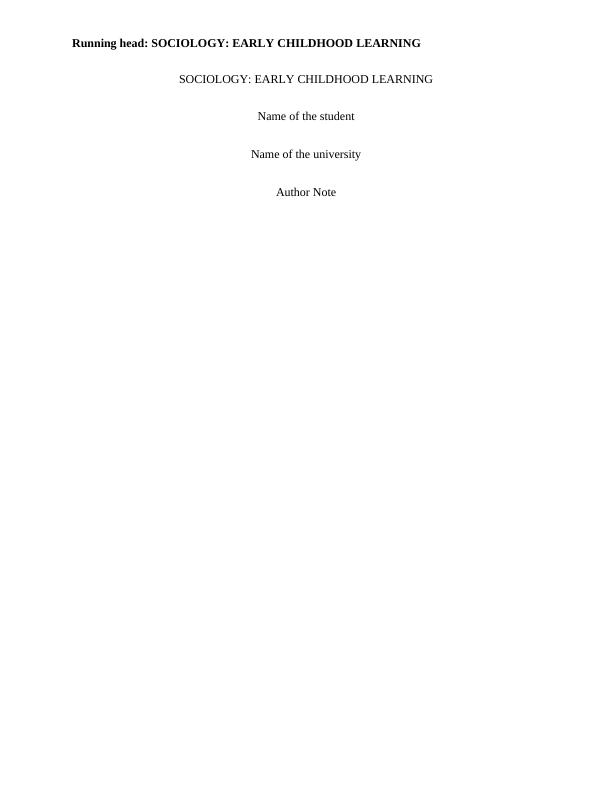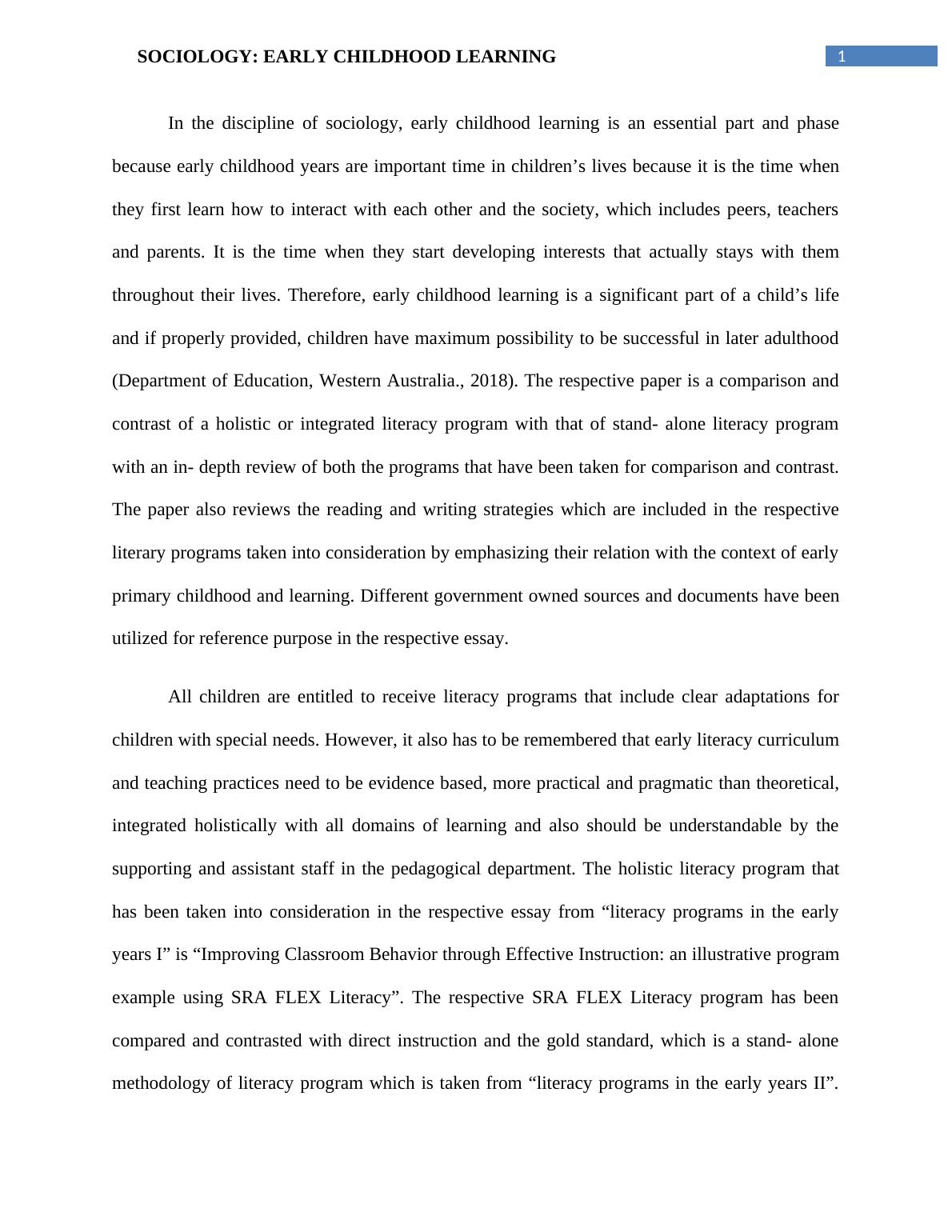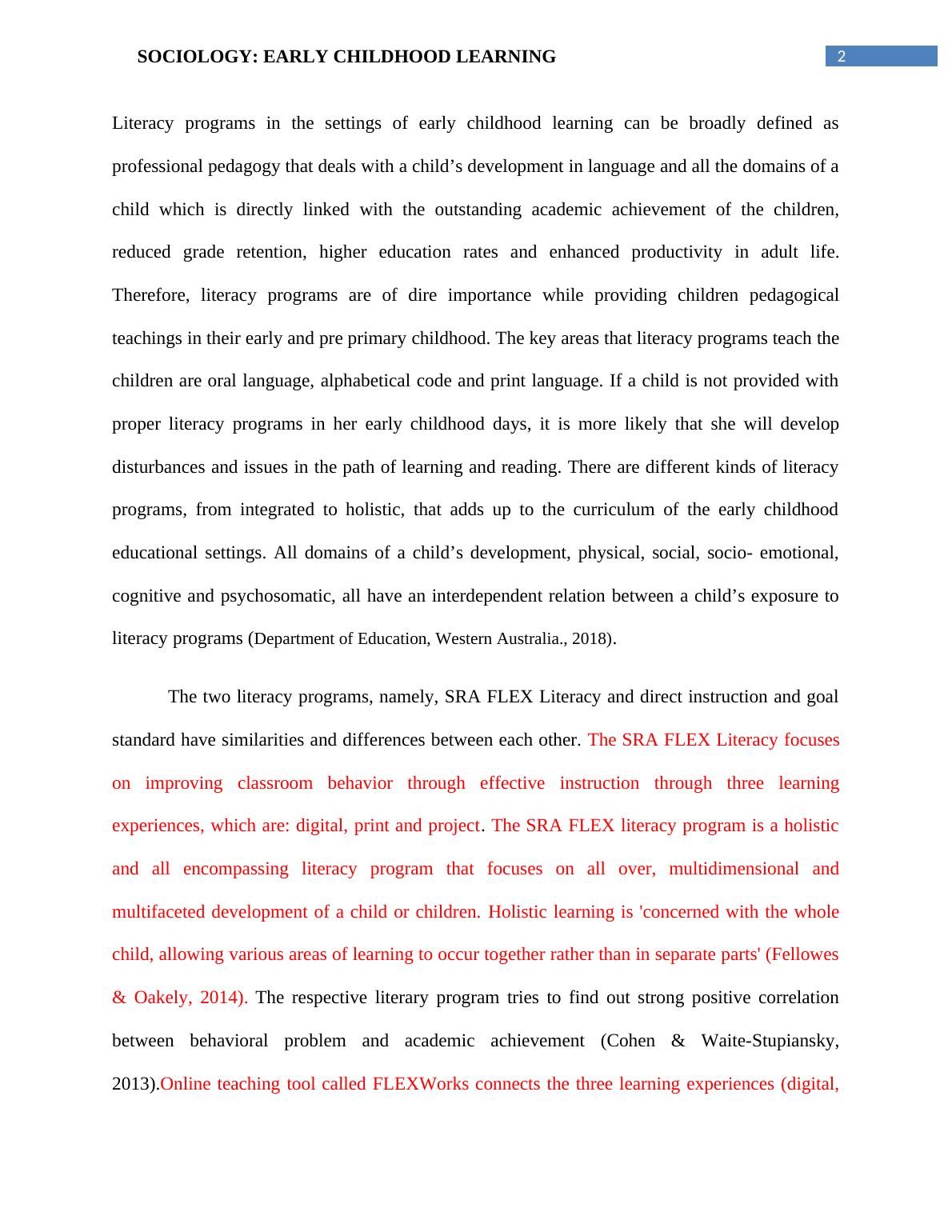The Sociology of Early Childhood -
Added on 2022-08-22
10 Pages2526 Words13 Views
Running head: SOCIOLOGY: EARLY CHILDHOOD LEARNING
SOCIOLOGY: EARLY CHILDHOOD LEARNING
Name of the student
Name of the university
Author Note
SOCIOLOGY: EARLY CHILDHOOD LEARNING
Name of the student
Name of the university
Author Note

1SOCIOLOGY: EARLY CHILDHOOD LEARNING
In the discipline of sociology, early childhood learning is an essential part and phase
because early childhood years are important time in children’s lives because it is the time when
they first learn how to interact with each other and the society, which includes peers, teachers
and parents. It is the time when they start developing interests that actually stays with them
throughout their lives. Therefore, early childhood learning is a significant part of a child’s life
and if properly provided, children have maximum possibility to be successful in later adulthood
(Department of Education, Western Australia., 2018). The respective paper is a comparison and
contrast of a holistic or integrated literacy program with that of stand- alone literacy program
with an in- depth review of both the programs that have been taken for comparison and contrast.
The paper also reviews the reading and writing strategies which are included in the respective
literary programs taken into consideration by emphasizing their relation with the context of early
primary childhood and learning. Different government owned sources and documents have been
utilized for reference purpose in the respective essay.
All children are entitled to receive literacy programs that include clear adaptations for
children with special needs. However, it also has to be remembered that early literacy curriculum
and teaching practices need to be evidence based, more practical and pragmatic than theoretical,
integrated holistically with all domains of learning and also should be understandable by the
supporting and assistant staff in the pedagogical department. The holistic literacy program that
has been taken into consideration in the respective essay from “literacy programs in the early
years I” is “Improving Classroom Behavior through Effective Instruction: an illustrative program
example using SRA FLEX Literacy”. The respective SRA FLEX Literacy program has been
compared and contrasted with direct instruction and the gold standard, which is a stand- alone
methodology of literacy program which is taken from “literacy programs in the early years II”.
In the discipline of sociology, early childhood learning is an essential part and phase
because early childhood years are important time in children’s lives because it is the time when
they first learn how to interact with each other and the society, which includes peers, teachers
and parents. It is the time when they start developing interests that actually stays with them
throughout their lives. Therefore, early childhood learning is a significant part of a child’s life
and if properly provided, children have maximum possibility to be successful in later adulthood
(Department of Education, Western Australia., 2018). The respective paper is a comparison and
contrast of a holistic or integrated literacy program with that of stand- alone literacy program
with an in- depth review of both the programs that have been taken for comparison and contrast.
The paper also reviews the reading and writing strategies which are included in the respective
literary programs taken into consideration by emphasizing their relation with the context of early
primary childhood and learning. Different government owned sources and documents have been
utilized for reference purpose in the respective essay.
All children are entitled to receive literacy programs that include clear adaptations for
children with special needs. However, it also has to be remembered that early literacy curriculum
and teaching practices need to be evidence based, more practical and pragmatic than theoretical,
integrated holistically with all domains of learning and also should be understandable by the
supporting and assistant staff in the pedagogical department. The holistic literacy program that
has been taken into consideration in the respective essay from “literacy programs in the early
years I” is “Improving Classroom Behavior through Effective Instruction: an illustrative program
example using SRA FLEX Literacy”. The respective SRA FLEX Literacy program has been
compared and contrasted with direct instruction and the gold standard, which is a stand- alone
methodology of literacy program which is taken from “literacy programs in the early years II”.

2SOCIOLOGY: EARLY CHILDHOOD LEARNING
Literacy programs in the settings of early childhood learning can be broadly defined as
professional pedagogy that deals with a child’s development in language and all the domains of a
child which is directly linked with the outstanding academic achievement of the children,
reduced grade retention, higher education rates and enhanced productivity in adult life.
Therefore, literacy programs are of dire importance while providing children pedagogical
teachings in their early and pre primary childhood. The key areas that literacy programs teach the
children are oral language, alphabetical code and print language. If a child is not provided with
proper literacy programs in her early childhood days, it is more likely that she will develop
disturbances and issues in the path of learning and reading. There are different kinds of literacy
programs, from integrated to holistic, that adds up to the curriculum of the early childhood
educational settings. All domains of a child’s development, physical, social, socio- emotional,
cognitive and psychosomatic, all have an interdependent relation between a child’s exposure to
literacy programs (Department of Education, Western Australia., 2018).
The two literacy programs, namely, SRA FLEX Literacy and direct instruction and goal
standard have similarities and differences between each other. The SRA FLEX Literacy focuses
on improving classroom behavior through effective instruction through three learning
experiences, which are: digital, print and project. The SRA FLEX literacy program is a holistic
and all encompassing literacy program that focuses on all over, multidimensional and
multifaceted development of a child or children. Holistic learning is 'concerned with the whole
child, allowing various areas of learning to occur together rather than in separate parts' (Fellowes
& Oakely, 2014). The respective literary program tries to find out strong positive correlation
between behavioral problem and academic achievement (Cohen & Waite-Stupiansky,
2013).Online teaching tool called FLEXWorks connects the three learning experiences (digital,
Literacy programs in the settings of early childhood learning can be broadly defined as
professional pedagogy that deals with a child’s development in language and all the domains of a
child which is directly linked with the outstanding academic achievement of the children,
reduced grade retention, higher education rates and enhanced productivity in adult life.
Therefore, literacy programs are of dire importance while providing children pedagogical
teachings in their early and pre primary childhood. The key areas that literacy programs teach the
children are oral language, alphabetical code and print language. If a child is not provided with
proper literacy programs in her early childhood days, it is more likely that she will develop
disturbances and issues in the path of learning and reading. There are different kinds of literacy
programs, from integrated to holistic, that adds up to the curriculum of the early childhood
educational settings. All domains of a child’s development, physical, social, socio- emotional,
cognitive and psychosomatic, all have an interdependent relation between a child’s exposure to
literacy programs (Department of Education, Western Australia., 2018).
The two literacy programs, namely, SRA FLEX Literacy and direct instruction and goal
standard have similarities and differences between each other. The SRA FLEX Literacy focuses
on improving classroom behavior through effective instruction through three learning
experiences, which are: digital, print and project. The SRA FLEX literacy program is a holistic
and all encompassing literacy program that focuses on all over, multidimensional and
multifaceted development of a child or children. Holistic learning is 'concerned with the whole
child, allowing various areas of learning to occur together rather than in separate parts' (Fellowes
& Oakely, 2014). The respective literary program tries to find out strong positive correlation
between behavioral problem and academic achievement (Cohen & Waite-Stupiansky,
2013).Online teaching tool called FLEXWorks connects the three learning experiences (digital,

End of preview
Want to access all the pages? Upload your documents or become a member.
Related Documents
Developing Literacy Assignment PDFlg...
|12
|3070
|77
Early Childhood Education and Care Using an integrated curriculum approachlg...
|12
|2755
|348
Designing early childhood curriculam PDFlg...
|7
|1598
|72
Evidence of Learning Using action Learning Principleslg...
|12
|2842
|65
Communication, language and literacylg...
|11
|2347
|126
ECL300 Approaches to Literacy in the Early Years | CDUlg...
|13
|2967
|329